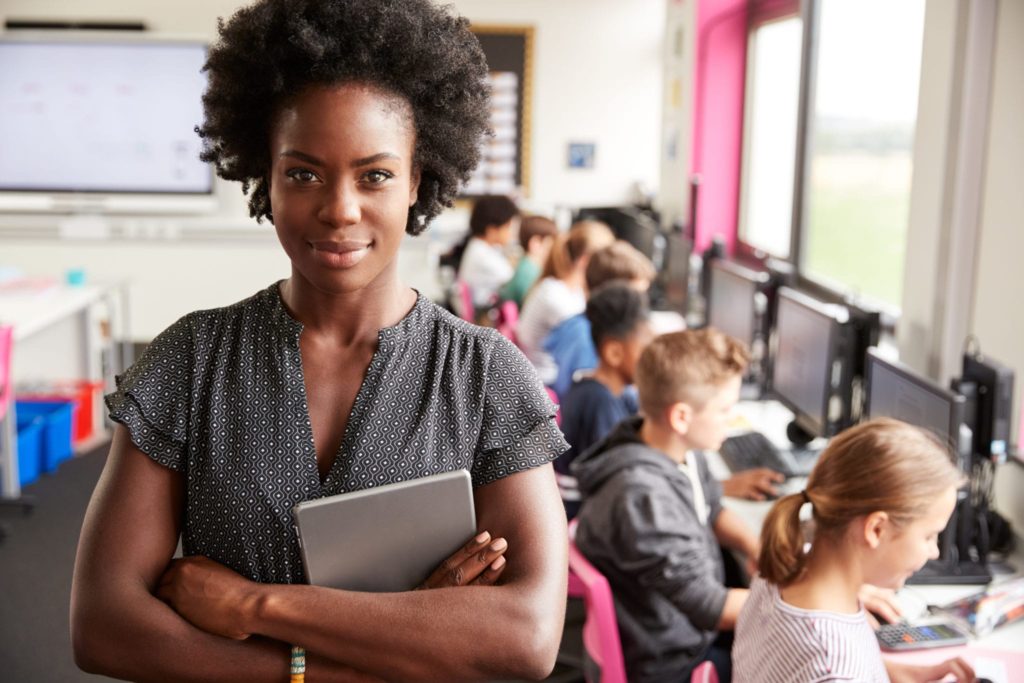How a Black Teacher Impacted Me
An EdTrust intern pays tribute to a teacher for preparing her as only a Black woman could. #TeacherAppreciationWeek

“Did you read all of these chapters in one night?” Ms. Lewis, my fifth-grade teacher, asked. I looked her in the eyes and nodded confidently. “Yes,” I replied, “I enjoy reading.” Despite her prompting me to account for how I could have read so many chapters, I remember feeling comfortable. To an outside audience, this must have looked like an interrogation, and there’s a good chance that had this been a different teacher, one who did not look like me, I would have felt that way too. It’s likely that this conversation would have hurt my self-esteem, as I might have felt like I was being doubted. But, with Ms. Lewis, a Black teacher who looked like me, it felt more like a genuine exchange of curiosity and understanding. Her presence and shared background made me feel believed in and, more importantly, seen.
Later, Ms. Lewis pulled me aside and applauded me for both my reading and the way I handled my conversation with her. I remember being confused about why this small interaction was, apparently, such a big deal. However, now that I’m in my 20s, I look back fondly on this experience from elementary school and recall Ms. Lewis with deep admiration. I realize that the exchange was about more than simply trying to make sure I was being honest. She was preparing me for a world in which my abilities and my intelligence would be doubted as I got older. She was preparing me, a young Black girl, in a way that only a Black woman could.
During this Teacher Appreciation Week, I’m thinking about the many teachers like Ms. Lewis who have a profound impact on their students’ lives and empower them by seeing those students and allowing those students to also see themselves reflected in the classroom.
Ms. Lewis was just one of three Black teachers I’ve had throughout my entire K-12 journey and thus far in college. The elementary school I attended in the William Penn School District was a predominantly Black public school with around 300 students. There were seven grades total, counting kindergarten, and about 21 grade-level teachers. Of those 21 teachers, only four — or 19% — were Black in a school where more than 90% of the students were Black. Sadly, that percentage of Black teachers would be considered high around the country. According to a report from EdTrust, Black teachers make up only 7% of the teaching workforce. This disparity shows that there’s a desperate need for more intentional efforts to recruit, retain, and support Black educators. When only a small fraction of teachers shares the same racial or ethnic background as the majority of the students they serve, it creates a disconnect and a missed opportunity for cultural understanding and support.
Ms. Lewis seamlessly wove in cultural references that resonated with students and the community while simultaneously teaching us about language and literature. Her classroom was a safe space where we could explore our academic potential while also embracing our cultural roots.
Despite these connections, I realize that Ms. Lewis also took on the lion’s share of disciplining other students — often popping into classrooms to get things under control when another teacher was struggling or having students who were misbehaving personally brought to her. Sadly, she’s not alone. As another EdTrust report noted, Black teachers are often perceived primarily as enforcers, rather than educators. This reductive stereotype undermines the nuanced role Black teachers play in fostering cultural understanding and support among their students and makes it difficult for Black teachers to do what they actually signed up for — teaching. It also hurts Black teacher retention and discourages many would-be Black educators from pursuing teaching in the first place. It’s no wonder the rate of Black teachers in the education system is declining. When Black students don’t see Black teachers, how can they imagine themselves in those roles?
DEI initiatives aim to address this issue by promoting diversity, equity, and inclusion in the educational landscape, which is why it is so troubling to see those efforts increasingly come under attack. When we talk about DEI initiatives in education, we’re talking about making sure that Black educators feel supported to teach, so that Black students feel empowered to learn.
In a society that often overlooks the multifaceted roles that teachers, particularly Black teachers, play in shaping the lives of their students, Teacher Appreciation Week takes on a deeper significance. So, let’s honor Black teachers and the impact they have.